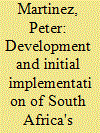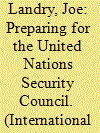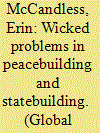|
|
|
Sort Order |
|
|
|
Items / Page
|
|
|
|
|
|
|
| Srl | Item |
| 1 |
ID:
157175


|
|
|
|
|
| Summary/Abstract |
South Africa is one of the few countries in Africa that has codified a national space policy. South Africa's first public national space policy was adopted in 2009. The policy has given direction and purpose to the country's recent space activities. Prior to this, space activities in South Africa were disparate and uncoordinated. Because space policy is not a primary policy issue, but rather an ancillary policy issue, the development of space policy had to be couched in terms that made it clear to policymakers exactly how space activities would contribute to national development and other policy priorities. This required building capacity in government to engage in policy discussions around these issues. We describe the process that was followed to raise the political profile of space affairs to the point that it became a policy issue for the South African government. The policy development narrative is arranged in a series of ten goals that were addressed during the policy development process. These goals speak to how one can address the political and systemic challenges of space policy formulation in the context of an emerging space nation that is also a developing country. The goals may thus be of interest to other emerging space nations at a similar stage in their development.
|
|
|
|
|
|
|
|
|
|
|
|
|
|
|
|
| 2 |
ID:
127233


|
|
|
|
|
| Publication |
2014.
|
| Summary/Abstract |
Through a qualitative comparative case study, this investigation examined the process by which three school districts in Wisconsin, U.S.A., developed a school energy policy and complementary energy education plan. To guide the process, the researchers created an outline of recommended steps for the districts to follow. Although there were variations in the sequence and perceived ease of the steps, the Energy Task Force members involved in the process found the outline to be a supportive guide. Further analysis of the cases involved interviewing members of the Energy Task Forces to identify facilitating and obstructing factors. The study concluded that factors such as level of environmental literacy, along with aspects of the school culture and leadership, interacted to influence the successful drafting of school energy policies and education plans. In addition to introducing an outline of recommended steps that can be used by other school policy development teams interested in promoting energy efficiency, this study adds insights into the analysis of energy policy work within the context of a school setting.
|
|
|
|
|
|
|
|
|
|
|
|
|
|
|
|
| 3 |
ID:
175256


|
|
|
|
|
| Summary/Abstract |
Energy efficiency is one of the key goals in energy and climate policies. However, it is known to be difficult to define and measure. In the literature, there are many debates on the appropriate way to measure energy efficiency performance for policy development. There is also a fair share of confusion over how different energy efficiency performance estimates should be interpreted. We discuss the sources of contention by examining different definitions, methods, measures and policy objectives that are used to evaluate energy efficiency. The objective is to present the different results and purposes in a systematic manner within the broader end goal of improving national energy efficiency. A clearer picture of the underlying assumptions, boundaries and perspectives behind energy efficiency performance is important for policy assessment. With this larger goal in mind, we conclude that policymakers are free to choose any definition, method and measure for analysis. However, results should be interpreted with respect to the method, assumptions, limitations and context that they were developed for. Specifically, differences in results at different levels of analysis should be studied in detail to understand the challenges faced in translating efficiency improvements at the device, process and sub-sector levels to national level improvements.
|
|
|
|
|
|
|
|
|
|
|
|
|
|
|
|
| 4 |
ID:
115153


|
|
|
|
|
| Publication |
2012.
|
| Summary/Abstract |
The global climate policy environment is currently characterised by a small number of national or regional 'flagship' emissions trading schemes and a very large number of smaller more targeted 'flotilla' policies. We use an assessment framework to identify the characteristics of policies that affect their likelihood of introduction and alteration during the policy development process. We conclude that this mix of flagship and flotilla policies is at least in part an inevitable consequence of incumbent stakeholder pressure that results in flagship policies being blocked or weakened by those opposing action, and if weakened sufficiently, possibly blocked by those seeking stronger action. In contrast, smaller flotilla policies can be designed to have less impact on large incumbents and/or be of benefit to a different group of stakeholders who then provide political support. As a result, flotilla policies are likely to remain as key elements of the climate policy mix, to reduce emissions beyond those achieved by flagship policies, and to reduce emissions where no flagship policies exist. These findings have two consequences for policy design: the need to ensure that flagship policies do not reduce the effectiveness of flotilla policies, and that flagship policies are capable of being enhanced over time.
|
|
|
|
|
|
|
|
|
|
|
|
|
|
|
|
| 5 |
ID:
189885


|
|
|
|
|
| Summary/Abstract |
In the run up to Canada’s bid for a seat on the United Nations Security Council (UNSC), Global Affairs Canada undertook thorough policy preparations to prepare for a potential term. Notwithstanding the unsuccessful vote on Canada’s candidacy, sharing our approach to policy design is worthwhile so that current and future policymakers can replicate these efforts and learn lessons from our experience. Indeed, transparency and openness are critical to the functioning of liberal, democratic institutions; seeing “how the sausage is made” can improve public perceptions of government accountability, which is critical in a time of waning trust in institutions. Given the wide breadth of issues that UNSC member states must be ready to engage on, the team designed a cross-cutting approach to policy development which ensured that stakeholders were able to provide valuable input to help shape Canadian positions. This process involved the crafting of “signature initiatives” and position papers to advance Canadian priorities in a structured and effective manner over the course of the potential UNSC term.
|
|
|
|
|
|
|
|
|
|
|
|
|
|
|
|
| 6 |
ID:
171411


|
|
|
|
|
| Summary/Abstract |
In a recent article, Santeramo and Searle (2019: Henceforth San-Sea) argued that the linkages between the soy oil and palm oil markets and their land use consequences could negatively affect the climate performance of the US Renewable Fuel Standard (RFS) and California's Low Fuel Standard. To support their arguments, San-Sea estimated the own and cross-price elasticities for supplies of soy and palm oils in the US. These authors refer to a valid point that induced land use changes may negatively impact emissions savings due to biofuels. However, their estimated elasticities provide no new insight on this issue. In addition, their approach, findings, analysis, and conclusion are subject to several deficiencies and limitations. These authors provide no new evidence for the link between biofuel production and land use change due to substitution among vegetable oils. In what follows, we reflect on some important facts and concerns.
|
|
|
|
|
|
|
|
|
|
|
|
|
|
|
|
| 7 |
ID:
121427


|
|
|
|
|
| Publication |
2013.
|
| Summary/Abstract |
Peacebuilding and its relatively new partner in international policy discourse and practice-statebuilding-are moving in increasingly larger circles with the recognition that business cannot be done as usual in fragile and conflict-affected states where 1.5 billion of the world's population resides. With rising prominence comes ever greater scrutiny about their nature and means for their practical realization. This article reflects on a question central to this scrutinizing that has befuddled scholars, practitioners, and policymakers alike over the past decade-how should progress out of fragility and conflict, or toward peacebuilding and statebuilding, be measured? Investigating a related question-are we making progress on this profoundly challenging task?-the article considers how international actors are endeavoring to make right on their promise to put national actors at the helm of these projects, which is increasingly assumed to be the primary driver for success in both. Examining these questions in light of scholarship, practice, and a topical policy dialogue case-the International Dialogue on Peacebuilding and Statebuilding-the article argues that, while the process and emerging outputs are messy and challenge established norms of what constitutes good assessment, they are manifesting profound changes in policy and practice, with potentially radical implications for the ways that peacebuilding and statebuilding are measured and aid decisions are undertaken.
|
|
|
|
|
|
|
|
|
|
|
|
|
|
|
|
|
|
|
|
|